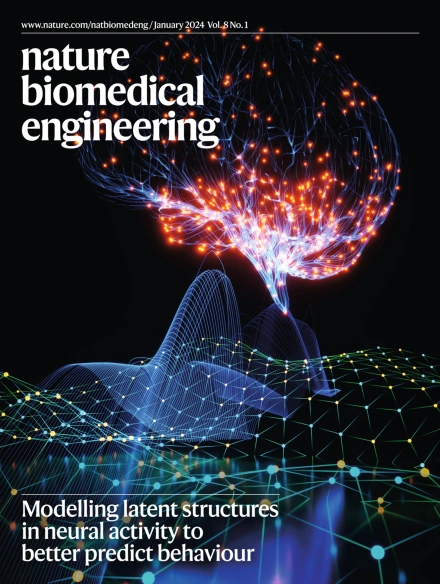Enzyme-converted O kidneys allow ABO-incompatible transplantation without hyperacute rejection in a human decedent model.
IF 26.8
1区 医学
Q1 ENGINEERING, BIOMEDICAL
引用次数: 0
Abstract
ABO-incompatible kidney transplantation is widely used to meet the escalating need for organs. Current recipient-centric desensitization protocols involving antibody depletion through plasmapheresis increase the risk of infections, perioperative bleeding events and costs. Here we present a donor-centric desensitization protocol, converting type-A kidneys into enzyme-converted O kidneys during hypothermic perfusion to remove the A antigen from the kidneys. An ex vivo model resulted in no antibody-mediated injury. Encouraged by this, an enzyme-converted O kidney was transplanted into a type-O brain-dead recipient with a high titre of anti-A antibody, and no hyperacute rejection was observed. The graft was well tolerated with no evidence of antibody-mediated rejection for 2 days. Antibody-mediated lesions and complement deposition were found starting 3 days post-transplant, coinciding with A-antigen regeneration, and later higher Banff scores, suggesting an immune-mediated response. Single-cell sequencing confirms the elevated expression of accommodation-related genes, suggesting the potential for longer-term tolerance. This study provides a donor-centric organ engineering strategy and has the potential to broaden the reach of ABO-incompatible kidney transplantation, improving the fairness of and access to organ allocation.酶转化O型肾脏允许abo不相容移植,在人类死亡模型中没有超急性排斥反应。
abo血型不相容的肾移植被广泛用于满足日益增长的器官需求。目前以受体为中心的脱敏方案涉及血浆置换抗体消耗,增加了感染风险、围手术期出血事件和成本。在这里,我们提出了一种以供体为中心的脱敏方案,在低温灌注期间将a型肾脏转化为酶转化的O型肾脏,以从肾脏中去除a抗原。离体模型没有产生抗体介导的损伤。受此鼓舞,将酶转化的O型肾移植到具有高滴度抗a抗体的O型脑死亡受体中,未观察到超急性排斥反应。移植耐受良好,2天内无抗体介导的排斥反应。移植后3天开始发现抗体介导的病变和补体沉积,与a抗原再生一致,随后Banff评分较高,提示免疫介导的反应。单细胞测序证实调节相关基因的表达升高,提示长期耐受性的潜力。本研究提供了一种以供体为中心的器官工程策略,并有可能扩大abo血型不相容肾移植的范围,提高器官分配的公平性和可及性。
本文章由计算机程序翻译,如有差异,请以英文原文为准。
求助全文
约1分钟内获得全文
求助全文
来源期刊

Nature Biomedical Engineering
Medicine-Medicine (miscellaneous)
CiteScore
45.30
自引率
1.10%
发文量
138
期刊介绍:
Nature Biomedical Engineering is an online-only monthly journal that was launched in January 2017. It aims to publish original research, reviews, and commentary focusing on applied biomedicine and health technology. The journal targets a diverse audience, including life scientists who are involved in developing experimental or computational systems and methods to enhance our understanding of human physiology. It also covers biomedical researchers and engineers who are engaged in designing or optimizing therapies, assays, devices, or procedures for diagnosing or treating diseases. Additionally, clinicians, who make use of research outputs to evaluate patient health or administer therapy in various clinical settings and healthcare contexts, are also part of the target audience.
 求助内容:
求助内容: 应助结果提醒方式:
应助结果提醒方式:


